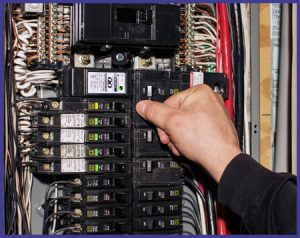 The last thing any homeowner needs to stress about is their home’s electrical system. You rely on a proper working system for your daily life to run smoothly. If you ignore potential issues, a faulty electrical system can be detrimental to your family’s safety. Fires caused by faulty wiring, fuses or circuit breakers happen every year and can be easily prevented.
The last thing any homeowner needs to stress about is their home’s electrical system. You rely on a proper working system for your daily life to run smoothly. If you ignore potential issues, a faulty electrical system can be detrimental to your family’s safety. Fires caused by faulty wiring, fuses or circuit breakers happen every year and can be easily prevented.
It’s important to know what you are looking at (and hearing) in your home’s electrical system. For instance, a sparking sound from an outlet is a sign of a faulty system which poses a risk of fire and electrical shock. Flickering lights should not be ignored, as it could be a sign of a faulty electrical panel or an overloaded circuit.
Here are 5 things to consider when you are looking at electrical system components in your home, or a home that you are buying. Remember, always call a licensed professional electrician when dealing with repairs or upgrades to your home’s electrical system.
1. Dated Components
Home owners should consider inspecting and replacing the wiring system for a home that is over 50 years old. It is typical for older homes to have dated components such as aluminum or knob-and-tube wiring. Upgrading your service to 220 should also be considered for an old home, so you can power all of your household’s appliances without overloading the fuses or cicuits.
2. Grounded Receptacles
A grounding wire is used in power outlets to prevent electric shocks. Hot outlet points that smell of smoke or produce sparks mean that you should call an electrician. In accordance with the National Electrical Code, you should also replace all the two-pronged outlets in your home with three-pronged outlets, as it means they are grounded.
3. Circuit Breaker Panel
This panel is in place for home electrical safety, not just power. Every homeowner must know where the panel is located in case of a blackout or a blown fuse. Each circuit breaker must be easy to identify and properly labeled. They must also have a proper working protection. Although sometimes they are an annoyance, these fuses and circuit breakers are built-in safety devices for your home, designed to automatically trip or blow to interrupt the flow of electrical current into the overload cable.
4. Smoke Detectors
Before moving into a home, it’s a good idea to inspect the smoke detectors and consider replacing the whole system if one or more units don’t work properly. All detectors MUST have a battery in them — even hardwired units. That way the alarms will function in the event of a power outage. Smoke detectors must be inspected regularly
5. Overhead Wiring
Must not be obstructed or reachable and should be a little over 10 feet above the ground.

